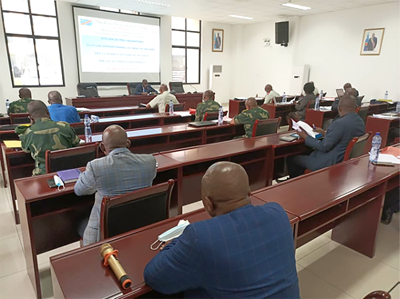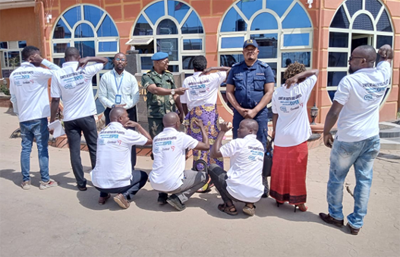Annual Update 2022 VNG International

Participants at the Kinshasa national workshop for the validation of the local security plans, March 2022. These workshops, organised by the National Ministry of Interior, involve various national structures and make them aware of the challenges that local administrators and their communities face.
Photo: ESPER Kinshasa, Thierry Kambere,
VNG International
‘It is exciting to see that local administrators are engaging on two levels to address security challenges in their zones. They engage with the population in order to gain their trust and they work with higher level government to move their agendas forward.’
Volkert Doop
ESPER Project Manager

Group photo in Ituri province after the installation of the complaints mechanism for concerned citizens.
Bunia, 13 February 2022.
Photo: ESPER Ituri, Jean-Louis Warabi, Cordaid
‘% of local security council members (incl. civil society) that confirm that the causes and consequences of security problems have been well defined by the local security action plan and [believe it reasonable] that [the identified] actions are able to eliminate these’.
Baseline Y1 : 63%, Target for Y4 : 80%, Realized in Y2 : 92%.
Dealing with Conflict, Fragility
and Migration by strengthening democratic
local government
Featured Project
DR Congo, ESPER Peace and Security program in East DRC
For several decades the Democratic Republic of Congo has been immersed in cycles of violence, which have had a brutal effect on the social, political and administrative fabric. Since 2016, VNG International has built a team in the DRC which focusses on addressing the root causes for conflict at a local level. Furthermore, it supports local authorities in bringing these challenges to the attention of provincial and national authorities. The vast dimensions of the country, the long distances and the divides between the eastern part of the country, which has faced the brunt of the violent conflict over the past decades, and the capital city of Kinshasa at the western side of the country, all have contributed to fragmented political and administrative response to the conflicts.
Since September 2020, VNG International and Cordaid have started the four-year programme ‘Ensemble pour la Sécurité et la Paix à l'Est de la RDC’ (ESPER). This programme is the follow-up of the CISPE programme (“Consortium for Integrated Stabilisation and Peace of DRC”, 2015-2019).
The objective of ESPER is to contribute to stabilization through promoting and improving security and justice governance as well as social cohesion in the eastern DRC. Congolese (local) authorities and civil society organizations are actively contributing to these processes. The programme supports the conception and implementation of so-called Local Security Action Plans (PAS). Together with local chiefs and administrators, relevant actions are identified for follow up at higher levels of government. This includes, among other issues, the treatment and payment of government officials, the widespread issue of ‘harassment’ and illegal taxation along provincial transportation arteries.
Results achieved:
- So far, the programme has worked with communities and local government to have them discuss and reach a common understanding of security problems and formulate solutions together. Traditionally the relations between authorities and the communities they serve are strained in this conflict zone. However, we noted an increased satisfaction level among the population with respect to their participation and inclusion in local meetings, discussing security matters. (Baseline : 29%, Year 2 : 64%, Target : 70%)
- Furthermore, an increasing number of community members feel that their priority needs in justice and security are now addressed rather than ignored by government structures (police, army, justice, administration). This is not as obvious as it sounds, given the context where salaries for public servants, including army and police are not regularly paid. We keep tracking this and try to identify ways to render this inclusion sustainable. (Baseline : 38%, Year 2 : 56%, Target : 55%)
- Although different per locality, the results suggest that dedicating attention to inclusion, can improve the relationships between local authorities and populations.
- Besides local governments working to improve the relationships with the civilian populations, these local administrations find it difficult to raise awareness at the provincial and national levels of government for running their daily affairs. For a myriad of reasons, local (security) problems are kept at distance from the centres of power in the provincial capitals and in Kinshasa.
- During the ESPER Steering Board meeting, led by the governors of the three provinces in which we work, we set up lobbies to request specific attention for the identified security challenges. The three chairmen of the three provincial civil society committees, each presented an advocacy note on key security problems. In North Kivu this concerned armed banditry and kidnappings, in South Kivu the customary power conflict in the Plaine de la Ruzizi and in Ituri the specific problems and insecurity rendered by the presence of armed groups.